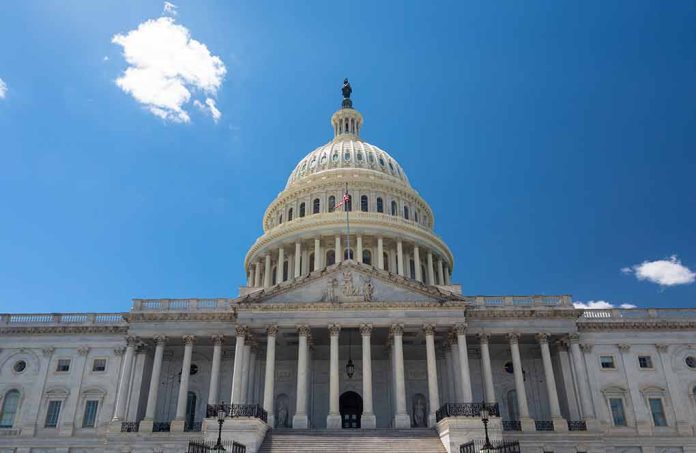
Over 80 House lawmakers are demanding immediate action from the Department of Homeland Security to address the surge in organized retail theft, a crime that’s costing retailers billions and endangering public safety.
At a Glance
- Bipartisan group of 80+ House lawmakers urge DHS to tackle organized retail crime (ORC)
- ORC caused nearly $70 billion in losses for U.S. retailers in 2019, with increasing yearly losses
- Lawmakers request updates on efforts to establish an organized retail crime coordination center
- California legislators approve bipartisan bills to combat retail theft
- The INFORM Consumers Act of 2022 imposes requirements on high-volume third-party sellers
Bipartisan Effort to Combat Organized Retail Crime
In a striking display of bipartisanship, more than 80 House lawmakers are pressing the Department of Homeland Security (DHS) to take decisive action against organized retail crime (ORC). Led by Rep. David Joyce, R-Ohio, this coalition of legislators is seeking immediate intervention to address a problem that’s not only causing massive financial losses but also posing significant public safety risks.
The urgency of the situation is underscored by alarming statistics. According to a Retail Industry Leader’s Association report, ORC resulted in nearly $70 billion in financial losses for U.S. retailers in 2019 alone. This figure has continued to climb year after year, affecting businesses of all sizes, communities, and consumers.
“The risk of ORC is not only due to the violence oftentimes displayed during the act of retail theft, especially to retail workers, but also health risks posed by consuming stolen goods like baby formula or pharmaceuticals, which may be improperly stored or tampered with prior to the final purchase by a consumer,” the legislators are writing in a letter to be sent later on Thursday.
Calls for a Coordinated Response
At the heart of the lawmakers’ demands is the establishment of an organized retail crime coordination center. This proposed center aims to improve information sharing, resource allocation, and strategic planning to combat ORC more effectively. The bipartisan group is requesting updates from DHS on the progress of this initiative, which they believe could lead to more effective prevention and enforcement actions.
“This Center could facilitate better information sharing, resource allocation, and strategic planning, ultimately leading to more effective prevention and enforcement actions,” they wrote.
The push for this coordination center isn’t new. Rep. Joyce previously led efforts to secure funding for it through the House Appropriations Committee’s homeland security panel. The initiative began as a bipartisan bill involving Joyce, former Rep. Ken Buck, R-Colo., Rep. Dina Titus, D-Nev., and Rep. Susie Lee, D-Nev., highlighting the broad support for tackling this issue.
State-Level Action in California
While federal lawmakers are pushing for action, individual states are also taking steps to address retail theft. In California, a state particularly hard-hit by ORC, Assembly lawmakers have approved a package of bipartisan legislative bills aimed at providing tools to reduce theft and hold criminals accountable.
“Californians have spoken loud and clear: They want to feel safe, whether it’s when they’re shopping, walking down the street or going to the park with their kids. These bills are a turning point for California. We are saying enough is enough on organized retail theft. I thank my Assembly colleagues for protecting shoppers, workers and business owners by passing these bills out of the Assembly. Now that we’ve taken action, I expect the Senate to move quickly and send these bills to the Governor for signature.”
The California legislative package includes measures to create a new felony for stealing with intent to sell merchandise, allow aggregation of stolen property across locations for felony grand theft charges, establish retail crime restraining orders, and impose penalty enhancements for high-value property theft or destruction. Importantly, the bills also focus on addressing underlying causes of theft and incentivizing diversion and rehabilitation for offenders.
Federal Legislative Efforts
At the federal level, the retail industry has been engaged in legislative efforts against ORC since the early 2000s. A significant milestone was reached with the passage of the INFORM Consumers Act in 2022, which imposes stringent requirements on high-volume third-party sellers and online marketplaces. This act is enforceable by the Federal Trade Commission and state attorneys general, providing a powerful tool in the fight against ORC.
Additionally, the Combating Organized Retail Crime Act of 2023 aims to create a federal task force for better coordination among law enforcement agencies. This multifaceted approach reflects the complex nature of ORC and the need for a comprehensive strategy to combat it effectively.
As these efforts continue at both the state and federal levels, it’s clear that addressing organized retail crime has become a priority that transcends party lines. The coming months will be crucial in determining the effectiveness of these initiatives in curbing a crime that threatens not only businesses but also the safety and well-being of communities across the nation.
Sources
1. Dozens of bipartisan lawmakers press DHS for action on organized retail theft









